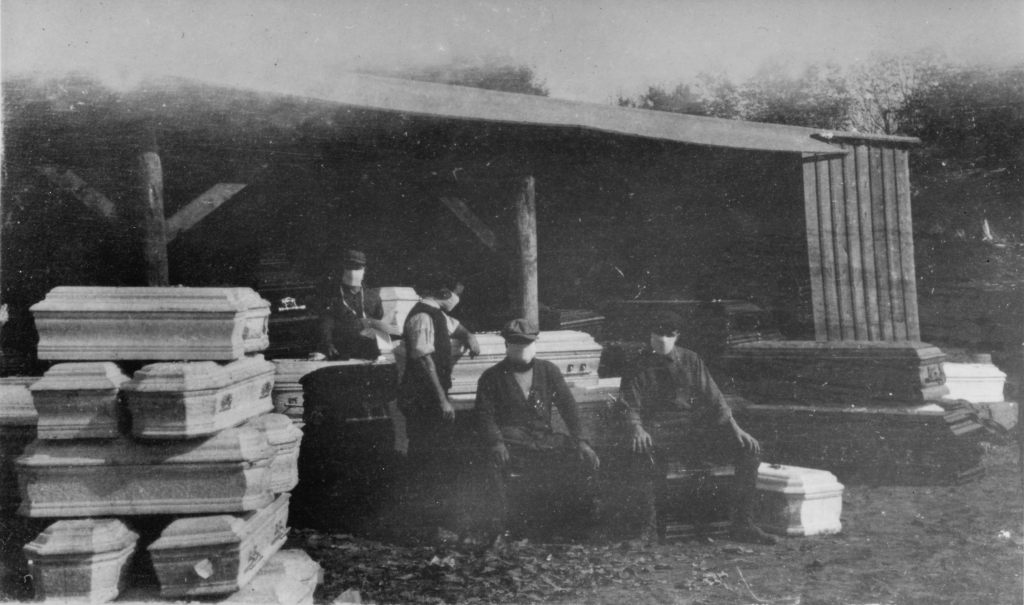
Robert Campion
Dad stood and counted all 9 members of his friends’ family.
Scranton, PA.
My father, Robert Campion, was born in Scranton, PA in 1910. He died in Philadelphia in 1975. He was the 7th of 8 live births, born to Martin Jesse Campion (1868-1941) and Mary Connery Campion (1872-1944). Martin and Mary married in 1891. Pop was a talented story teller. He could raise emotion, rally support, and invite both self-exploration and curiosity about the wider world.
He married my Mom, Mary Elizabeth Boyle Campion (1913-1981), on January 3, 1929 when she was only 15 and he only 18. They had 12 Children, 11 reached adulthood. There was a 29 year spread (first child at mom’s age 16, her last one month shy of her age 45). It was inevitable that some nieces would be older than their Aunts and many kids would overlap. At one point my mother’s youngest 3 and my oldest sister’s 6 meant 10 kids under the age of 10, might be underfoot.
Everyone gathered for dinner together, every possible night. Only work or Altar service or a school/ church function was a forgivable absence. Mom & Pop never spoke ‘baby-talk’ to us younger kids. Dinners were high-level discussions about politics and current events, with Dad leading conversations and encouraging debates. Even when our relatively homogeneous, Irish Catholic Family defaulted to the same opinion, he would designate a “Devil’s Advocate”, so that we could more fully explore topics. As part of a big family, there were many dramas and peaks and valleys of emotions. It was a ‘given’ that there would be 11 First Communions, Confirmations and Weddings. Just in our nuclear family 13 Birthday cakes could be relied upon. My last grandparent passed when I was just a toddler, but there were many funerals that were true celebrations of lives hard-lived.
We maintained three family traditions: One was to hold a WAKE with memorial stories, the more fabulous the better, Another was compartmentalization. No matter how painful the loss, the funeral would be scheduled so that no one missed school or work. The third, less frequent tradition, was that Dad would equate the current loss with past losses, and the one he most often referenced was the story of a childhood friend, lost to the “Spanish Flu”.
When Dad was 8 or 9 years old, he walked to school every day with a best friend. The friend lived closer to school, so Dad would stop to collect him in the morning, and again to say goodbye in the afternoon. This had been their routine, since first grade, when the mother’s introduced the boys on the first day of school. The families had a lot in common, both were Irish Catholic; the Campions with 8 children the other family with 7. There was not a lot of overlap, because Dad was one of the youngest, his friend the oldest. Both families relied on kids to do chores, and work after school. Even the 8 year-olds could sell newspapers, polish shoes or scavenge coal in winter and rotting fruits after harvest.
One Monday, after returning from school, Dad was called inside the home. During the day, his friend’s father had died ‘of pneumonia’. Dad and his young friend were needed to help lift the body up onto the Dining Room Table, for the viewing. The next day when he returned from school, he was again called in. Two infant daughters had died. The boys were asked to tuck the small bodies under the dead father’s arms. On the third day, two little brothers had died. Dad and his friend were asked to turn the chairs, backs to the table and lay a boy on each of the newly placed rows of chairs, on either side of their father. By now the mother was too sick or distraught to perform the task herself. That evening Dad mentioned the 5 deaths at dinner. His mother forbade him to see his friend again. He remembers walking past the house the next day, Thursday, feeling guilty, sad and frustrated. On the following Friday he walked past to see a “Carter” carrying bodies out of his friend’s home and throwing them uncovered onto an open, horse drawn wagon. They were not the only bodies in the cart. Dad stood and counted all 9 members of his friends’ family. His friend was one of the fresher corpses and landed so that Dad could see his beloved face. Dad continued on to school, and said that he never discussed the matter with his own parents.

Courtesy of the Catholic Archdiocese Historical Research Center
But when we were young, and he was besotted from stories and corn liquor at a Wake, he might tell all or part of the tale. With his gift for story-telling it was easy to see past the litany of facts to feel Dad’s grief and worry. As an adult, the story gives me some insight into some of his decisions and behaviors.
What I marvel most at are: The matter-of-fact expectations placed on small children, and the fact that Dad grew to host the largest and most inclusive parties of anyone I knew. He did not let germaphobia diminish his zeal for life, his curiosity and desire to build connections.
I haven’t thought of this story in many years. My sister Ellen Campion Bamba reminded me of it when we by telephone, before Easter. We were comparing current events to old times. Lots of emotional memories came spilling out. ‘Good Friday’ seems a good time to share a story of Death and Resurrection.
Contributed by Elizabeth Campion, daughter of Robert Campion.
